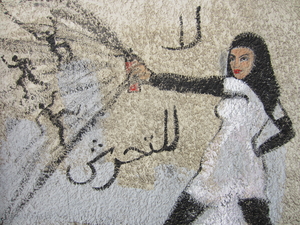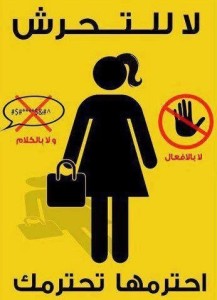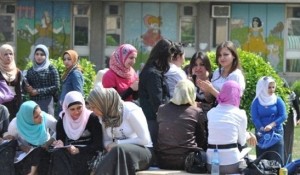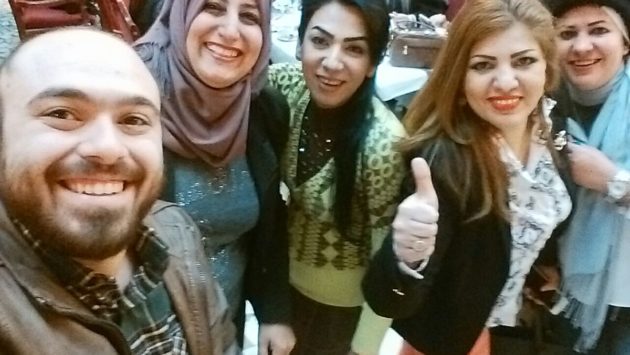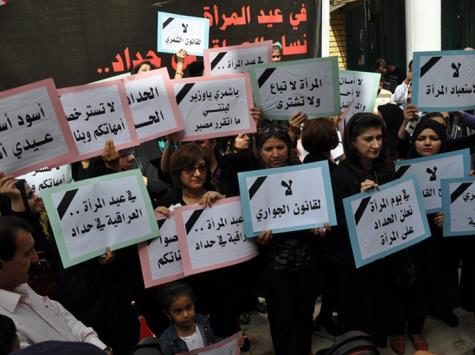Iraqi Women Among The Most Vulnerable To Sexual Harassment
Iraq is one of the worst countries in the world for women!
Iraqi Civil Society Solidarity Initiative (ICSSI), March 2014
Episodes of sexual harassment of women and girls in Iraq are increasing at a preoccupying rate, making Iraq one of the worst places in the world for women. An accurate diagnosis of the problem is lacking and institutions do not have a strategy to tackle it.
The Iraqi society has suffered from policies that divided the community into males and females, until normal coexistence between genders in public places became impossible. Many Iraqis are reluctant to walk in the street with their wife or daughters or sisters, fearing that they could be harassed, while others prevent their daughters from going out from home and studying, for the same reason. There is no accurate statistics on cases of harassment, but everyone agrees that the phenomenon is increasing dramatically. Harassers escape punishment and offended women keep silent for fear of being punished, rather than seeing justice prevail!
The Iraqi society witnessed in the past decades (especially the 1970s and 80s) the contribution of women in political and cultural life, their strong presence in most professions, coexistence of girls and boys in the same class at school and college, and streets were safe for women compared to now. But during the 90s, when the former president started his “faith” campaign, supporting views of conservative religious and tribal leaders in order to strengthen his power, Iraqi society saw a growing divide between male and female, which has been even intensified by the following Iraqi governments. They divided boys and girls starting in elementary schools, till some college departments. The division has been imposed in some workplaces and many public places, following the increasing influence of conservative religious parties, with their narrow-minded interpretation of religion, values and morals. This isolation increased repression of people’s feelings, inhibited relations of friendship and respect among men and women, and harassment therefore increased in mixed places.
The phenomenon of harassment of women includes various degrees of offence, starting with a hurtful phrase, and escalating sometimes to murder and rape. ICSSI in this article refers to some cases who appeared recently in the Iraqi news, hoping to bring more international attention to this problem.
At the end of 2012 two very young girls (Baneen, 4 years old and Abeer, 5 years old) were raped and killed in the province of Basra, and their bodies have been found on the street. In Erbil, at the beginning of 2014, six young men raped a 16 years old Syrian refugee right in the capital of the Kurdistan Region of Iraq. The phenomenon spreads all over the country, irrespective of the security situation.
Iraqi women are vulnerable to harassment even in public offices! In an interview quoted by Almada Press and published in January 18, 2014, the Minister of Women Affairs – who is known for her conservative opinions on women’s rights, and her lack of belief in gender equality – recognized the high rates of sexual harassment of women in Iraq, even in public offices. She declared: “many divorced women and widows are asked to compromise in order to get jobs or to continue their career in government departments. The government demanded to allocate a fixed percentage for women in job offers and reserved houses in residential compounds”. In her interview for Almada Press, the Minister said that “the ministry is receiving many complaints from women who have been sexually harassed in the street, in government departments, and offices of the private sector, including women journalists and activists”, asserting that “the phenomenon of sexual harassment is now threatening the safety of women”.
Almada Press also quoted a report by Thomson Reuters Charity Foundation, which considered Iraq, in November 2013, as the “second-worst place in the Arab world, after Egypt, for women”, and showed that “14.5% of Iraqi women have a job, while there are 1.6 million widows”. The report also pointed out that “two-thirds of Iraqi women ask their husbands’ permission to go to the health clinics”, asserting that “thousands of women are forced to work as prostitutes in neighboring countries because of the sectarian fighting and the exodus of refugees”.
The journalist Nihad Sabri wrote in an article published on “Women’s News Agency” that one of the polls conducted in Iraq showed that the harassers are mostly from the top-ranks in the career ladder. She stated: “Polls confirmed that 70% of women interviewed were subjected to sexual harassment from their supervisors, and for 81% of them this had a negative impact on their jobs because of their refusal.”
Iraqi women journalists are the most vulnerable to harassment by their colleagues in the Arab world! Many Iraqi journalists fear that, even if they reject sexual harassment within media institutions, their reputation may be spoiled in such a male-dominated and tribal society, where the clergyman enjoys great influence and control. After a seminar held in Baghdad by the Iraqi Association for Defending the Rights of Journalists, the President of the Iraqi Assembly, Ibrahim Al-Sarraji, declared to Moscow News that “Iraqi women journalists are exposed to sexual harassment within some media institutions, but we keep these cases secret for women’s refusal to disclose information, fearing defamation, since our society is a male dominated one. Also their relatives refuse to talk about what women experienced, fearing for the family’s reputation”.
Al-Wasat Website published the results of a questionnaire conducted by the Iraqi Media Women Forum, showing that 68% of 200 women journalists surveyed have been subject to sexual harassment, in terms of verbal or physical assault. Only 42% of those journalists continued working in the same office after harassment, while 45% of them left their job, and 13% were fired after the harassment episode.
Such rates of criminal behavior push for the need of immediate political action to address this problem, but also require re-thinking the whole approach to gender of the Iraqi people. If change does not come from politics, then maybe it’s civil society that needs to take the initiative.

